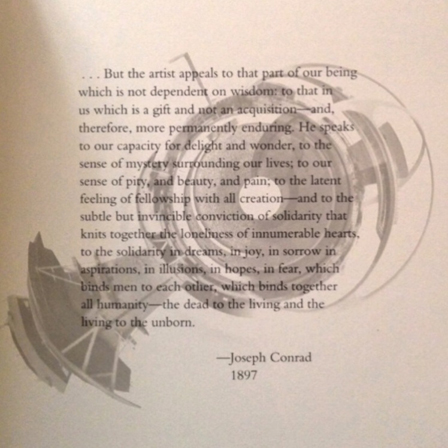There is a lot of trust involved, in the creative process. I’m not sure “in what,” really. But one must trust enough to not worry about the outcome, in order to follow whims all the way through.
Some people have a spiritual take on this sense of trust. Some are more methodical. But pretty much every successful creative professional I know understands the importance of trust in the processes of creation and productivity.
If one asks, “where is this going?” too soon, the soufflé deflates. This is very much at odds with the bottom-line mentality created by industrialization, which, in my mind, weirdly, still holds itself in charge of many organizations. Bottom-line thinking takes stock too soon; it tries to measure too frequently. Often, systems of measure and analysis over-simplify, leaving no room for input on subtle levels, exactly where a major breakthrough might lay. Have you ever taken an online survey? Did you feel like it asked you all of the right questions and gave you the space to speak your mind? Or were you limited only to the specific kind of feedback they were seeking?
Even schools are formulated in the image of the factory system. Why are we still turning students into factory workers when there aren’t factory jobs for them to fulfill when they graduate? It really doesn’t make any sense. But then, organizations feel obligated to try to make use of the backwards education graduates have received, and they set up antiquated systems exactly like factories, where people are meant to do as they’re told and not think.
How does that work? Do you ever not think? Personally, I can hardly ever stop thinking! And, I have the “audacity” to think my thoughts are valid!
The creative process meanders. It looks directionless, at first. By granting oneself freedom of thought, the mind can make new connections, tie things together where there used to be a chasm, and see things otherwise blocked by too much focus on “how things are/were.”
Creativity, innovation, and I would be so bold as to say productivity, are now seldom tied to clocking time in the way a factory can crank out widgets by the hour. Now that human ideas are the most valuable currency, it is actually detrimental to the process, to have people’s contribution tracked by minutes on a clock and by merely checking off quality controls by rote (what about questioning the measurements themselves every so often?).
People want to feel they are making a difference. They want to feel inspired. They want to be appreciated for the very unique contribution they make. They can’t stop thinking, and I believe that many, many thoughts are completely underutilized by employers and organizations, simply because they don’t make room for them.
In the words of the late, great Martin Luther King, Jr., I have a dream. I have a dream that more people will begin to question why their kids aren’t taught creative, entrepreneurial, and improvisational skills in school, and to make demands on their employers to humanize their working experience and that of future generations. I have a dream that airlines will stop treating passengers like cattle, and that cattle ranchers start treating cows with such compassion that the metaphor goes out of style. I have a dream that courtesy will find its way back into customer service, that taking pride in a client’s experience becomes part of what companies reward, that even the reward system itself can become de-systemized, and based more on real, live human opinion and expertise.
We are not robots, cranking out widgets. We can be trusted to make judgement calls. We can be relied upon to make good decisions, and trust in our own creativity.
We are unique individuals with contributions to make. I dream of a world where we all feel free and encouraged to make the contributions we’re passionate about, and where those freely expressed contributions not only empower those making them, but solve the world’s problems in the process.
A few great minds have inspired my dream, namely Sir Ken Robinson and Richard Florida. Sir Ken is the author of Out of Our Minds and Finding Your Element, and he gives amazing Ted talks on how to reinvent the way we educate. Mr. Florida is author of the Rise of the Creative Class, The Great Reset, and Who’s Your City?, and he blogs about how the new economy has formed around this new class structure.
What do you think? Do you hear the winds of change calling? Are you excited for a world where an individual’s talents are honored, bolstered, and rewarded? Do you think it’s possible?




